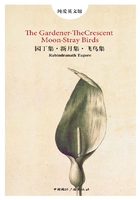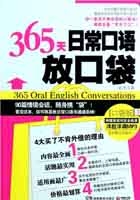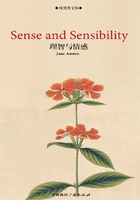159.all,both都
∴例:他的父母都是教授。
×误:His parents are all professors.
√正:His parents are both professors.
说明:all和both皆有“都”的意思,作代词all代表三个以上(可数名
词),both只用于两者。
∷如:Both her parents are well.
她的双亲都很健康。
They both came late this morning.
今早他们两个都迟到了。
I can both sing and dance.
唱歌跳舞我都会。
We all/All of us have to do our best. 我们人人都要尽力而为。
All of my friends like the singer.
My friends all like the singer.
我的朋友都喜欢这位歌手。
I'll invite all of you.=I'll invite you all.
我将会邀请你们全体。
注意:all的否定(部分否定)假如使用not来否定all,变成(未必全部都……)并非否定全部,而是否定一部分了。
∷如:Not all men live long.=All men do not live long.
未必所有人都长寿。
160.another,the other另一个
∴例:他有两本书,一本是旧的,另一本是新的。
×误:He has two books.One is old,another is new.
√正:He has two books.One is old,the other is new. 说明:another和the other都指“另一个”,但another是泛指不定数目中的另一个,the other是特指两个中的另一个。
∷如:To know is one thing,but to teach is another.
知道是一回事,教又是另一回事。
The skirt is a little too expensive,please show me another.
这裙子略微贵些,请拿别的给我看一看。
These are all we have,we have no other.
我们所拥有的全部只有这些,没有其他的了。
Some believe in God,others don't.
有人相信(信仰)上帝,也有人不信。
注意:the other(在两者中的)另一个;(用复数形式the others)三
个以上时,除了被提及的一个之外的其他,其余的。
∷如:I have two good friends.One is tall,the other is short.
我有两个好朋友,一个长的高,而另一个长得矮。
Two children went,but the others stayed.
有两个孩子走了,但其他的孩子们都留下来了。
Be kind to others.与人为善。
Some of the students went swimming,while the others sat on the beach for sunbathing.
有的学生去游泳,其余的坐在沙滩上做日光浴。
161.each每个人(物),every每个
∴例:他们每个人都有一台电脑。
×误:Every of them has a computer.
√正:Each of them has a computer.
说明:every是形容词,不是代词只能作定语,不能作主语或宾语;each既是形容词又是代词,可作定语又可作主语或宾语。
Take this medicine every four hours.
这个药每四小时吃一次。
Everybody's business is nobody's business.
三个和尚没水喝。(谚语)
Every student can not be hardworking.
Not every student can be hardworking.
并不是每个学生都会努力用功的。
Each of them has his own duty in the company. 在公司他们都有各自的义务。(each主语)
Each man has his own name.
人人都有各自的名字。(each形容词)
His mother tried to put by a little each month then.
他母亲那时设法每月存一点钱。(each定语)
162.each other,one another互相
∴例:我们互相说法语。
×误:We talk French each other.
√正:We talk French with each other.
说明:each other不当主语用,原则上指两个人相互之间。
三个人(三个)以上则用one another,可作宾语。
∷如:We helped each other in the job.
我们同心协力做这个工作。
Their parents respect each other.
他们的父母相敬如宾。
She and I looked at each other.
她和我面面相觑。
We should take good care of one another. 我们必须互相好好关照。
They are interested in each other's work.
他们对彼此工作感兴趣。
The just struggles of the people of all countries support each other.
全世界各国人民的正义斗争都是互相支持的。
注意:现在有时each other和one another通用。
For years the two sisters looked after one another/each other.
多年来两姐妹都相互照顾。
They have great concern for one another's(each other's).
他们很关心彼此的工作。
163.either任何一个(两者中)
∴例:那两个女孩中有一个是安的姐姐(妹妹)。
×误:Either of the girls are Ann's sister.
√正:Either of the girls is Ann's sister.
说明:either(两者中)任一,随便哪一个;
而either作主语时,谓语动词用单数。∷如:Either of them enjoys sport.
他们任何一个人喜欢运动。
Either of the cars will do.
那两部车,哪一部都可以。
I don't like either of the skirts.
我不喜欢这两条裙子中的任何一条。
We must not favour either side in the dispute. 在争论中我们不应偏袒两者中的任何一方。
On either side of the river lie fields of rice.
河两边都有稻田。
You can ask either of us for advice about your future.
有关你的未来我们俩谁都可以给你出主意。
164.everybody每个人
∴例:这里每个人都很亲切。
×误:Everybody here are very kind.
√正:Everybody here is very kind.
说明:everybody与everyone同义,但everybody较为口语化,作代词,“人人,每个人”视为单数,切记。
∷如:Everyone gets their/his/her legal rights by birth.
每个人一出生便享有合法的权利。
Everybody can not be a dancer.
并非每个人都可以成为舞者。
Everybody admires him.
人人都羡慕他。
Not everybody went there. 未必人人都去那里。
Everybody likes to be free.
每个人都喜欢自由。
I am sure everybody else will agree with me.
我确信其他人都同意我的想法。
The police questioned everyone who was at the party. 警察盘问了当时在聚会里的每个人。
165.few少数的(人)物
∴例:知道这首老歌的人非常少。
×误:Very few knows the old song.
√正:Very few know the old song.
说明:few作代词(视为复数)。
∷如:Few of the boys swim in the river.
这些男孩中几乎没有在那条河里游泳的。
Few of them like having supper now.
他们几乎没人现在想吃晚饭。
Few people live to be 100 in the world.
世界上很少人活到100岁。
Few of the players played really well in the team.
在这球队只有少数球员称得上球技精湛。
注意:few“几乎没有”(否定用法,通常置名词前),与之对应many“许多”,而a few“几个”(肯定用法,通常置名词前)。
Few things interest me nowadays.
最近几乎没有什么能引起我兴趣。
Does the singer have many fans?
那歌手有许多粉丝吗?
There are a few differences between the two. 两者间有一定差异。
Many applied,but only a few were accepted.
许多人应征,但只录取了少数几个。
There are many people here who can speak three languages.
这儿有许多人能说三种语言。
166.hers她的
∴例:我的笔比她的笔短。
×误:My pen is shorter than her.
√正:My pen is shorter than hers.
说明:形容词性物主代词只能作定语;作主语、表语或宾语,必须用名词性物主代词。
∷如:Her brother is a close friend of ours.
她的哥哥是我们的一位亲密朋友。(her作定语)
The man picked up his cap and left the room.
男士拿起帽子就走出房间了。(his作定语)
My shoes are here,where are hers?
我的鞋在这,她的在哪里?(my作定语)
He has found his dog,but he hasn't find yours.
他找到了他的狗,但没找到你的。(yours作宾语)
This green bag is hers.这个绿色的包是她的。(hers作表语)
Your watches are new,but ours are old.
你们的表是新的,但我们的手表是旧的。(ours作主语)
167.it它
∴例:你应该在字典里把它查出来。
×误:You should look up it in the dictionary.
√正:You should look it up in the dictionary.
说明:动词和副词构成的短语动词,如有宾语,可把宾语放在副词之前或之
后。
∷如:Please put on your cap.=Please put your cap on.
请带上你的帽子。
但如果宾语是人称代词则必须把人称代词放在副词前面。
∷如:Take it off.(Take off your shoes.=Take your shoes off.)
脱下你的鞋。
注意:it其他主要用法如下,
1.指气候,时间,距离等(译汉语常省略)
It has begun raining/to rain.开始下雨了。
It is/has been 35 years since I left Beijing.
我离开北京已35年了。
2.后接that从句或as if从句,成为seem,appear,happen,
occur,follow等动词的主语,译成汉语时多省略。
It seems that we will pass the exam.
我们好像能通过这个考试。
It looks as if it is going to snow.
看起来好像要下雪。
It happened that he was in Japan.
碰巧他在日本。
3.it作为形式主语,宾语,代替to do,that从句,wh-从句,
doing等译成汉语多省略。
It is impossible for him to buy the big house with cash.
要他用现金买这个大房子是不可能的。
(it形式主语,代替to buy)
It is said that haste makes waste.
有句话说得好,欲速则不达。(it代替that从句)It is no use crying over spilt milk.
牛奶倾覆,哭也无益。
(覆水难收。谚语)(it代替crying)
I found it quite pleasant to work with the lady.
我发现和这位女士共事很愉快。
(it代替不定式,做形式宾语)
We took it for granted that they would like the good idea.
我们想当然地认为他们会赞成这个好想法。
(it代替that从句)
4.用it is/was...that...强调句:
It was the day before yesterday that I met her in the
supermarket.
那正是前天我在超市遇到她的。
It is I that am to blame.是我该受谴责。
168.its它的(代词it的所有格)
∴例:这只鸟的身躯大,但嘴小。
×误:The bird's body is big,but it's mouth is small.
√正:The bird's body is big,but its mouth is small. 说明:it's是it is或it has的缩写形式;its是“它的”。
∷如:I bought a new overcoat.Its collar is fur.
我买了件新大衣,领子是毛皮做的。
The cat was licking its paw.
那只猫正在舔它的爪子。
Where is my bag?It's here.(It is)
我的包在哪里?它在这。
I can't use his car.One of its tires is flat.
我不能使用他的车,车的一个轮胎漏气了。
It's(It is)difficult to persuade him about the thing. 关于此事很难说服他。
169.mine我的(代词I的名词性物主代词)
∴例:你的手套暖和,但是我的不暖和。
×误:Your gloves are very warm,but my are not warm.
√正:Your gloves are very warm,but mine are not warm. 说明:my是形容词性物主代词,只能作定语。
My son is tall.(my修饰son作定语)
Our country is famous for the Great Wall.
我国以长城著名。
而名词性物主代词可作主语、表语和宾语。
∷如:Ours is a great socialist country.
我们国家是一个伟大的社会主义国家。
His model plane is white.Mine is red.
他的飞机模型是白色的,我的是红色的。
(mine可以用my model plane替换)
This watch is his,which one is yours?
这块表是他的,哪一块是你的?(表语)
This is your miniskirt.Have you seen hers?这是你的迷你裙,你看见她的了吗?(宾语)
He is an old friend of mine.
他是我的一个老友。(与of连用作定语)
The umbrella is not mine,but his.
那把伞不是我的,而是他的。
170.somebody某人,有人
∴例:有人想同你谈话。
×误:Somebody want to talk with you.
√正:Somebody wants to talk with you.
说明:somebody同someone作主语时谓语动词用单数。
∷如:Anyone thinks so.
任何人都那样想。
I didn't meet anybody.
我谁都没碰到。
There is someone(somebody)to see you at the door. 门口有人要见你。
Someone has parked his car in front of yours.
有人把他的车停在你的车子前面。
She's getting married to someone she met at work.
她要和一个她工作时遇上的人结婚。
I think you should talk to someone else about this problem. 我想你该和另外一些人谈谈这个问题。
注意:somebody名词(用作单数)重要人物:
He has the desire to be somebody.
他想出人头地。
That lady always thinks she is really somebody.
那位女士总是自以为了不起。
171.that那
∴例:昨天我学的第一课非常简单。
×误:The first lesson which I learned yesterday is very easy.
√正:The first lesson that I learned yesterday is very easy.
说明:一般指物时,关系代词用that或which都可以,但当先行词被序数词、形容词最高级修饰时,the only,the same,the very,all,
every,any,no等先行词为人和物,前有who,which等,一般用
that而不用which.
The city which(that)we visited last week is very beautiful. 上周我们参观的那个城市很美。
It is the second novel that I have read.
它是我读过的第二本小说。
The Summer Palace is the most beautiful park that I have ever been to.
颐和园是我曾到过的最美丽的公园。
The building which(that)stands by the river is our school.
耸立在河边的这座建筑是我们的学校。
She sold the best jewel that she had twenty years ago.
二十年前她把手中最好的宝石卖掉了。
That is the first time that a man walked on the moon. 那是人第一次在月球上行走。
This is the very magazine that I have been looking for. 这是我在寻找的那本杂志。
Who is the man that is standing under the big tree?
正站在大树下的男士是谁?
Look at the little boy and his dog that are walking up the street.
看从街上走过来的小男孩和他的狗狗。
This is the pen that he wrote his manuscripts with.
这是他用来写原稿的笔。
at that(副)而且,尚且
that is=that is to say(副)也就是,就是说
I am on holiday next week.That is to say,from Monday.
我下周放假,就是说,从星期一开始。
My friend owns lots of pictures,and famous ones at that.
我朋友拥有很多绘画作品,而且是名画。
172.what什么
∴例:我要喝的东西是苏打水。
×误:The thing what I want to drink is soda water.
√正:The thing which/that I want to drink is soda water.
说明:what不能引导定语从句,它是疑问代词,可作主语、表语、宾语和定语。
∷如:What's on the table over there?
什么在那边桌子上?(主语)
What's your brother in the company?
你哥哥在公司从事什么工作?(表语)
What are you looking for?
你在找什么?(宾语)
What time do you usually get up at home?
你通常在家何时起床?(定语)
注意:what只能引导名词性从句。
∷如:What we need is more time.
我们需要的是更多的时间。(主语从句)
I can't remember what he said in the classroom.
我不记得在教室他说什么了。(宾语从句)
That is what we are worrying about.
那正是我们所担忧的。(表语从句)
We should never pretend to know what we do not know. 我们决不应当不懂装懂。(宾语从句)
What she lacks is experience now.
她现在缺少的是经验。(主语从句)
173.who,whom谁
∴例:那是谁的新车?
×误:Who's new car is that?
√正:Whose new car is that?
说明:whose是who的所有格形式可作疑问代词,它在定语从句中作定语。
∷如:Whose is better,Mary's or Tom's?
谁的比较好,玛丽的还是汤姆的?(主语)
That book is mine.Whose is this?
那书是我的,这本是谁的?(表语)
The boy whose work got the prize is the youngest in his class.
作品得奖的男孩是班上最年轻的。(定语)
Whose are you going to take?
你要拿谁的?(宾语)
Whose dictionary is this?
这是谁的字典?(定语)
I have a friend whose sister is a singer.
我有一位姐姐是歌手的朋友。(whose定语)
He knows a girl whose father is working in a big company. 他认识一个女孩,她爸爸在一家大公司工作。(定语)
He is a good physician who cures himself.
能给自己治病的是好大夫。(谚)(who主语)
who's是who is,who has的缩写式。
174.something复合不定代词
∴例:我有重要的事要告诉你。
×误:I have important something to tell you.
√正:I have something important to tell you.
说明:some,any与和no与thing,body,one构成的复合不定代词something,anything,somebody,anybody,someone,anyone...有形容词修饰时,形容词置后。
∷如:Is there anything good in today's newspaper?
今天报上有什么好消息吗?
There is nothing wrong with the TV set.
这台电视机没有毛病。
Let us go somewhere quiet to have a talk.
让我们去安静的地方谈谈。
Nowhere else can you buy so many good books.
没有别的地方你能买到这些好书。
175.a few少数几个,few很少几个
∴例:他们中很少有人懂西班牙语。
×误:A few of them know Spanish.
√正:Few of them know Spanish.
说明:a few,few都是不定代词,但few表示否定概念,而a few表示肯定概念。
∷如:A few of us went to Paris.
我们中有几个人去过巴黎。(主语)
Few of my acquaintances like the film.
我认识的人中很少有喜欢这部电影的。
He has too few chances to enjoy himself.
他享受生活乐趣的机会太少了。
Few of the children noticed the time passing now.
现在孩子们当中很少有人注意到时间在消逝。
注意:a little,little(不可数)a little一些,表示肯定概念,little很少表示否定概念,两者差别同a few与few相似。在句中可作主语、宾语、定语……
∷如:My mother says little but does much.
我妈妈说得少做得多。(little作宾语)
I know a little about the film.
关于这部电影,我略有所知。(a little作宾语)
A little care probably could have prevented the accident. 当时稍微谨慎点就可能防止这次意外事故。(a little作定语)
I knew little or nothing about their plan.
对于他们的计划我几乎一无所知。














